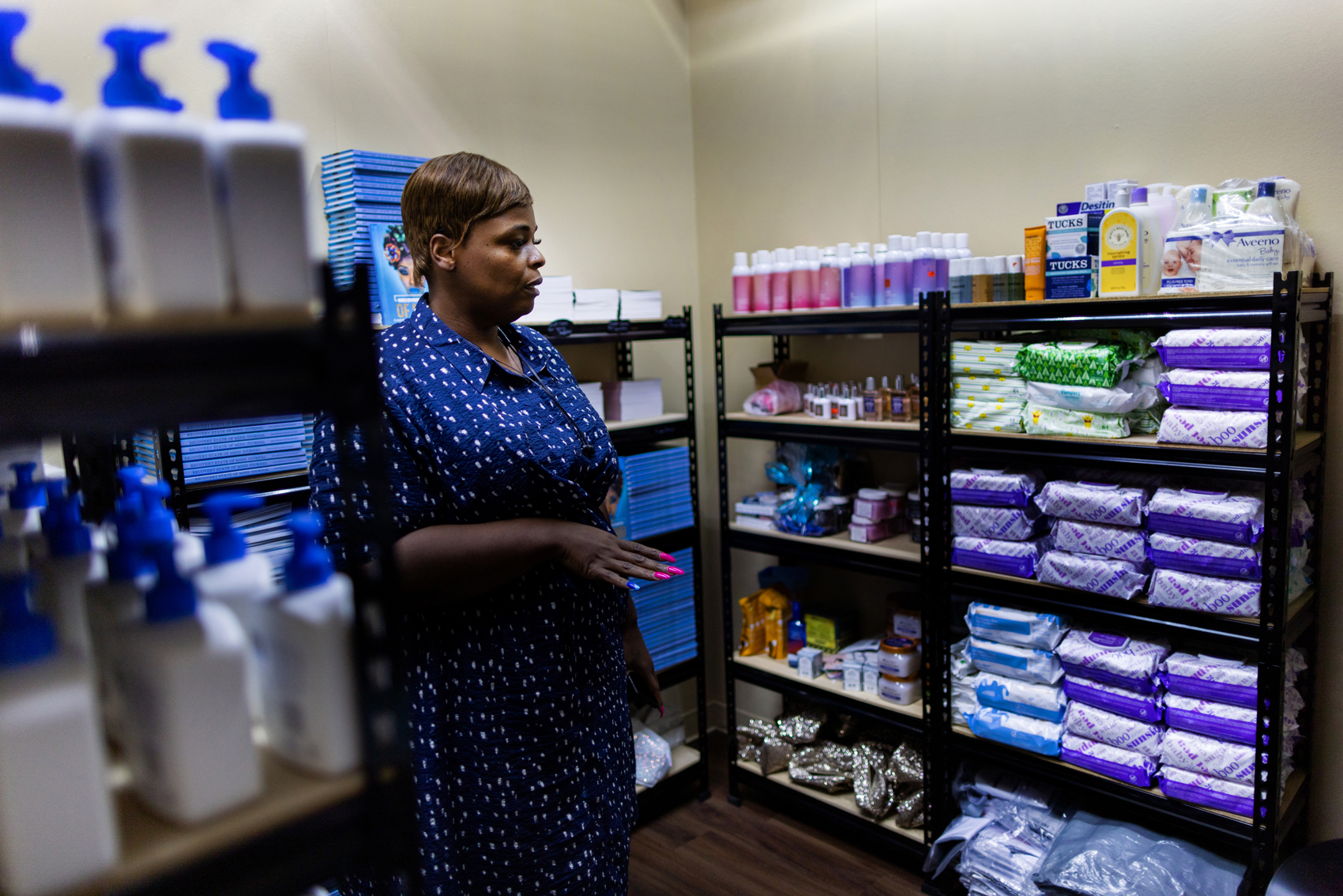|
Getting your Trinity Audio player ready...
|
Despite being home to the largest medical center in the world, Harris County has the worst Black maternal and infant mortality outcomes, consistently exceeding state or national averages since 2016, a newly released maternal and infant health report by Harris County Public Health confirmed.
The first-of-its-kind maternal and infant health report by Harris County Public Health was released Friday at the start of Black Maternal Health week to find solutions to improve maternal and infant health. The report analyzed data from 2016 to 2021 to reveal some of the underlying causes behind the racial disparities.
Between 2016 and 2020, Black people who gave birth in Harris County had the highest pregnancy-related death rate among all racial and ethnic groups in the U.S. at 83.4 deaths per 100,000 live births.
Harris County also had a higher infant mortality rate than Texas and the U.S. during that period, with infants born to Black people experiencing the highest rate at 11.66 per 1,000 births. The infant-mortality rate decreased in 2021.
Between 2016 and 2020, the top three leading causes of pregnancy-related deaths in Harris County were conditions predominantly related to pregnancy, such as excessive weight gain or weight loss during pregnancy; pregnancy-related complications such as anemia; and death from any obstetric cause, according to the report.
But more than 80 percent of pregnancy-related deaths in the U.S. are preventable. Here’s what we know about the problem and ways that parents can protect themselves and their babies.
What are the barriers to care for Black parents?
Officials say there are several factors that contribute to the pregnancy-related death rate, but among one of the most important is inadequate access to health care.
Laws that support women are necessary to address the complexities of the Black maternal health crisis in Harris County, said Angela Burgess, a maternal fetal medicine specialist at UTHealth, in a September 2023 interview. Roughly half the patients at the hospital do not have insurance and rely on Medicaid for care, but those same patients would lose access in the year following delivery.
“There are risks that are after pregnancy within that postpartum period,” Burgess said. “There are increased risks for cardiovascular diseases, hypertension, diabetes, and these are things that will eventually kill in the community as well.”
The report found that Black people in Harris County had the highest percentage of hypertension both before pregnancy at 2.6 percent, and during pregnancy at 7.84 percent compared to all other racial and ethnic groups.
In 2021, more than half of deliveries in Harris County were covered by Medicaid. Gov. Greg Abbott signed Texas House Bill 12 into law last year, expanding Medicaid coverage from two to 12 months. The law took effect on March 1 and state officials project it will benefit approximately 137,000 women in fiscal year 2025.
Public health officials say the Medicaid coverage extension is vital because birthing patients can receive postpartum care such as nutrition and breastfeeding education, immunization, and health care.
Benefits of breastfeeding
If possible, breastfeeding provides infants with an ideal source of nutrition and helps protect both the birthing parent and child from developing certain illnesses, officials say. While Harris County had a higher rate of breastfeeding after discharge from the hospital than both Texas and the U.S. from 2016 to 2021, the report found that Black birthing parents had the lowest percentage of breastfeeding after discharge.
Officials say this could be partly due to their economic status and lack of support for breastfeeding in the workplace. A 2015 study found that Black women return to work sooner than other racial and ethnic groups and are more likely to work in environments that don’t offer privacy rooms and breaks for pumping.
For Black women, studies show there are also historical challenges that may reflect a negative perception of breastfeeding, along with a lack of access to information that promotes and supports breastfeeding.
How do health disparities impact Black maternal health?
Health disparities are caused by broader social and economic inequities, structural and implicit bias, and discrimination in the medical field, officials said.
In her more than a decade of medical experience, Burgess said she has seen ample instances of bias against Black parents, such as labeling a patient noncompliant for missing a medical appointment or failing to take medication.
“Once the patient is labeled a noncompliant, then that can lead to dismissal of certain things,” Burgess said.
Noncompliant behavior is a widely used term in the medical field that is often caused by breakdowns in communication and a lack of comprehension due to cultural barriers, Fred Kleinsinger wrote in a 2003 article. Those communication failures can interfere with effectiveness of treatment and have serious consequences.
But “noncompliant” patients may have legitimate reasons for missing appointments or not taking medication, Burgess said. They may have transportation issues or can’t find childcare, for example.
“Before you label a patient, you must understand what their social situation is, or what their barriers to care are,” she said. “That's the only way that you're going to truly be able to help a patient.”
What is being done to address the high mortality rate?
Identifying barriers and risk factors is the first step in Harris County Public Health’s fairly new maternal and child health program, said Ericka Brown, the agency’s director of the community health and wellness division.
“Unfortunately, many of the clients that we serve are of a vulnerable population,” she said in a July 2023 interview.
Their clients may face challenges such as housing instability, food insecurity, financial insecurity, or there may be a lack of education, Brown said.
“(There’s) just a myriad of things that are certainly not conducive to a healthy environment for the birthing person to deliver a healthy child,” she said.
The county’s home visitation program, which is affiliated with Healthy Families America, will match up to 300 families through 2025 with coordinators who will guide them through pregnancy, childbirth and parenting and facilitate wellness checks, prenatal care, and connections to health care and other needed services.

Harris County Commissioners Court unanimously approved $7.7 million in July 2022 to fund the program to address the disparities in Black maternal health. In May 2023, the county received an additional $1.4 million in federal funding from the Consolidated Appropriations Act to support a maternal mental wellness program that includes postpartum doulas and behavioral health support.
By identifying barriers, Brown said, they’re able to set goals to create a healthy environment for the birthing person from prenatal to delivery and until the child is 3 years old.
“We want to make sure that parents and child(ren) are well-equipped for self sustainability,” she said.
The program is long overdue, said Kay Matthews, founder of Shades of Blue Project, which works with the county as a connector for referrals. The Houston-based nonprofit has strived to break cultural barriers in maternal mental health since 2013 and serves hundreds of families, typically in their postpartum period.
Brown said that they’ve had a “steady stream” of applicants since the program began enrolling families in January of 2023. As of March 31, 176 families have benefited from the program, surpassing the county’s target goal of 150 participants for the fiscal year.
On Friday, HCPH also introduced its Maternal Health Bill of Rights during its second annual Maternal and Child Health conference. The comprehensive list outlines birthing parents’ options and rights, including everything from prenatal to postpartum care,
“It is intended to be a pocket guide for the birthing person at every step of the way; at every prenatal visit,” Brown said.
But in addition to a bill of rights, Matthews said Black women also need something simple and tangible that they can use to be proactive and advocate for themselves.
“Relying on just the health care system is not working,” she said in a September 2023 interview.
“This is why mortality, morbidity rates look (the way) they look. That's not what folks need, we need to start equipping the community to stand on their own.”
Shades of Blue Project provides their clients with an information card the size of a business card to encourage a collaborative effort between parents and their doctor.
“Sometimes our voices are muted when we need help,” Matthews said. “These cards are allowing them to ask the questions and say the things that need to be said, even when they feel a little powerless.”
But ultimately, Burgess said the number one factor is having a doctor that you trust.
“Black doctors are 100 percent crucial,” she said. “We've seen, and there's data and evidence, that shows that when patients are taken care of by Black doctors, you do see a decrease in terms of some of the adverse outcomes.”



